Celebrating youth and women in construction
Habitat for Humanity Terwilliger Center for Innovation in Shelter (TCIS) had the honour of attending a graduation ceremony hosted by our valued partner, The Toolkit Skills and Innovation Hub (TTI) on June 5th, 2024 in Nairobi.
It was a day filled with excitement and promise as youth from diverse backgrounds gathered to receive internationally recognized certifications in various technical skills.
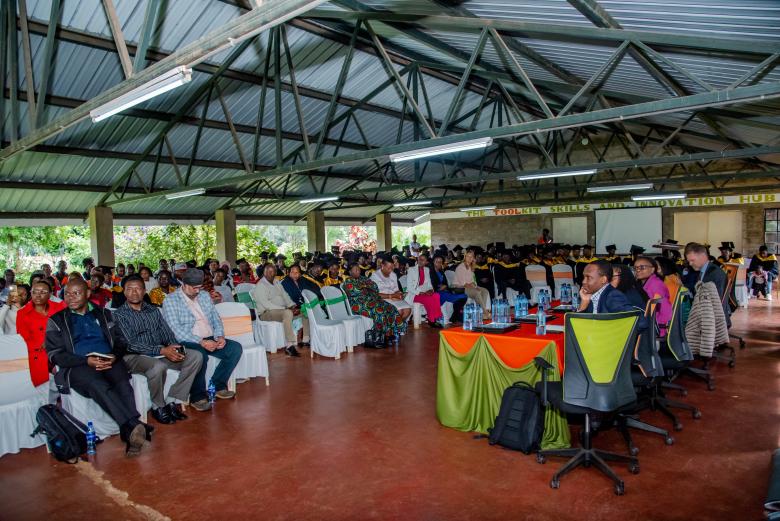
With support from our donor Challenge Fund for Youth Employment (CFYE), Habitat for Humanity’s TCIS, has partnered with The Toolkit Skills and Innovation Hub, along with young innovators, TVET institutions, government agencies, and the public sector to equip youth with skills necessary for providing quality housing construction services and materials, and to offer them decent employment opportunities.
Through this partnership, we aim to impact about 650 youth by providing training and upskilling in renewable energy, plumbing, wiring, landscape architecture, and advanced welding using virtual reality technology.
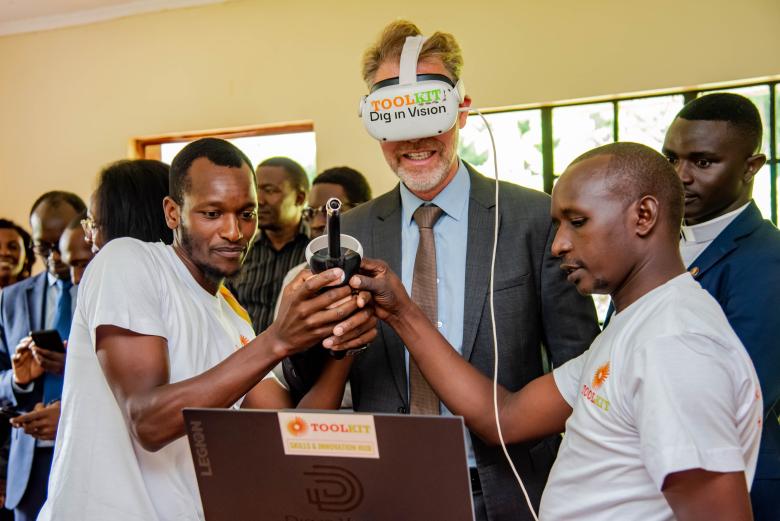
Deputy Ambassador of Germany to Kenya trying out the VR welding simulator
The colourful event was attended by various partners, notably the Kenya National Qualification Authority, the Deputy Speaker of the Kenya National Assembly, Gladys Shollei, the Deputy Ambassador of Germany, and our funding partner CFYE represented by Kenya country lead Beatrice Gichohi, among other market players.
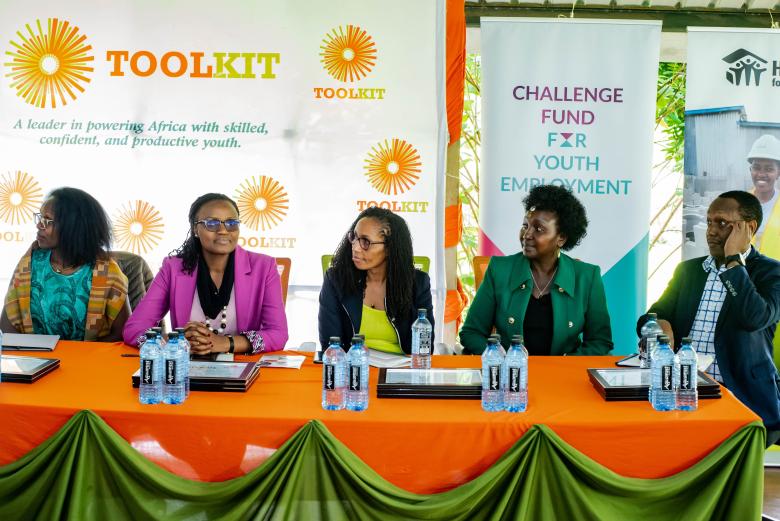
From left to right: Jane Kamphuis, Director, TTI; Dr. Alice Kande, Director, Kenya National Qualification Authority; Beatrice Gichohi, CFYE Kenya country lead; Hon. Gladys Shollei, Deputy Speaker of the Kenya National Assembly and Masua Mutua, Regional Manager, TCIS.
What was truly remarkable about this lineup of guests was that it demonstrated the importance of bringing diverse actors together in co-creating solutions to the industry’s challenges.
Beatrice Gichohi, CFYE’s Kenya Country Lead, highlighted this collaborative spirit, emphasizing that addressing youth unemployment and scaling participation for both women and youth in the construction sector requires diverse voices working together.
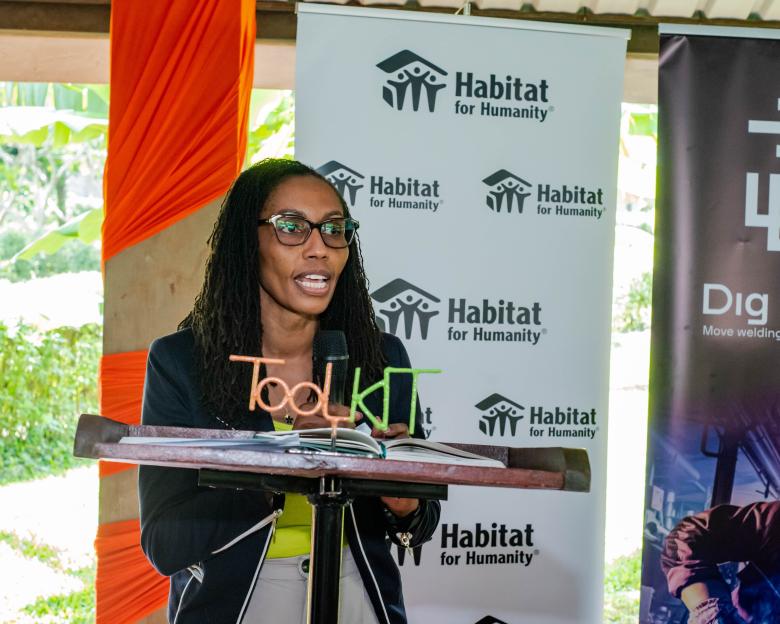
Beatrice Gichohi, CFYE Kenya country lead
This sentiment was echoed by the various industry players who have partnered with TTI to open pathways to internships and job opportunities for trainees. Financial partners like CFYE have supported Habitat for Humanity in our partnership with TTI, while technology experts like Dig In Vision have introduced revolutionary tools like the Virtual Reality Welding Simulator, which has reduced training costs and time from two to three years to a remarkable three months at the institution
Government partners, such as the Kenya National Qualification Authority, ensure that both trainees and instructors receive internationally recognized certification, which opens them up to opportunities both locally and abroad.
This significant need for technical skills in Kenya and Africa was highlighted by Hon. Shollei who encouraged youth, particularly women, to take up space in the sector.
Her words were emphasized by Masua Mutua, Regional Manager HFH TCIS, who underscored the acute need for housing among these groups, especially as youth form the largest demographic in Africa. In this regard, he emphasized the importance of youth and women being active participants in championing solutions and affirmed our continued commitment to support their meaningful participation in this sector.
Masua also noted that TTI’s passion for youth and women resonates deeply with Habitat for Humanity. Their dedication to training and securing employment for the trainees was evident, as several of them graduated in absentia, having already secured jobs in the EU and locally.
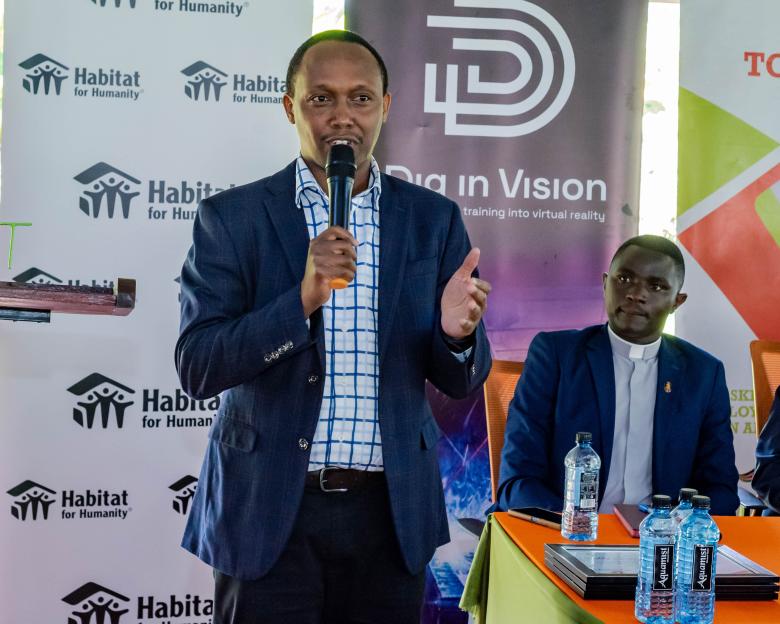
Masua Mutua, Regional Manager, TCIS
In his keynote address, H.E. the Deputy Ambassador of Germany encouraged the trainees to explore international career paths, noting Germany’s annual shortage of approximately 200,000 skilled workers. He urged them to continue upskilling and highlighted the German government’s commitment to supporting local TVET institutions to meet the evolving demands of the labor market.
The ceremony concluded with the guests reaffirming their commitments to partnering with the Institution to further opportunities in the construction sector.
As Habitat for Humanity, we were proud to witness the next generation of youth and women construction professionals take their first steps in their careers. We look forward to empowering more Kenyan youth and women, driving positive change in the construction industry, and building a brighter future for Africa.

Celebrating youth and women in construction
Transforming lives in Nepal: Safe homes and empowered communities
Where would you sleep, live, and raise your kids without a safe place to call home? Adequate housing is recognized as a human right. Yet, in Nepal, nearly half of the population lives in substandard housing conditions, hindering their opportunities for social and economic advancement. Like many in her country, 29-year-old Pramila, a devoted mother of two, intimately understands the impact of this challenge.
Where would you sleep, live, and raise your kids without a safe place to call home? Adequate housing is recognized as a human right. Yet, in Nepal, nearly half of the population lives in substandard housing conditions, hindering their opportunities for social and economic advancement. Like many in her country, 29-year-old Pramila, a devoted mother of two, intimately understands the impact of this challenge.
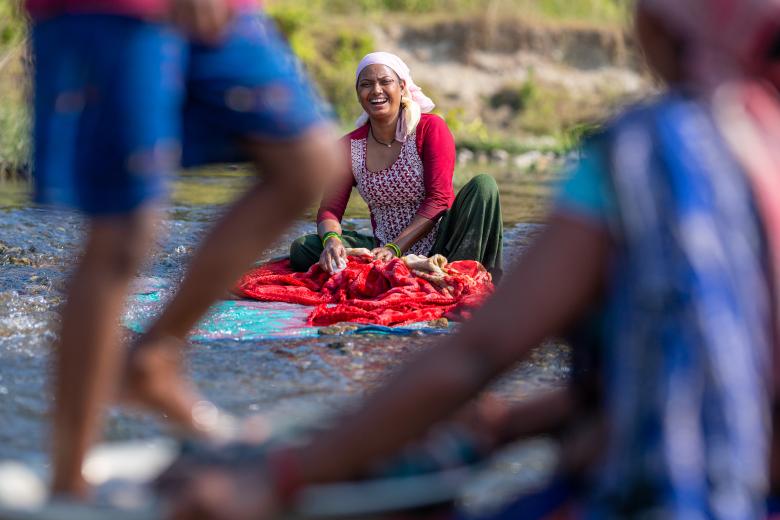
Housing reality in Nepal
In Nepalese culture, owning a house is a legacy parents want to pass on to their children. But for many, despite hard work and consistent savings, the ability to afford a safe and permanent home is out of reach. Instead, they live in informal settlements on disaster-prone land with many hazards and difficult living conditions. Often lacking access to running water, sanitation, or medical care, they share small buildings as extended families and live in constant fear of eviction.
Pramila’s family did not even have formal access to their own living space. They had to park their rickshaw in a neighbor’s yard and cross someone else’s property every time they wanted to go out of the house. Because the construction methods are not up to standard, the buildings in the informal settlements are very vulnerable to natural disasters.
Commitment to self-determination
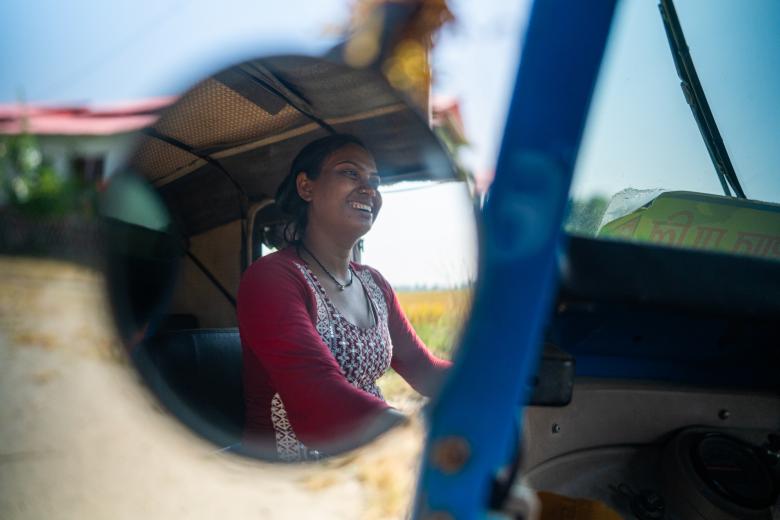
For Pramila, the situation got even worse when her husband had to leave their family to seek employment in the Middle East.
“When my husband had to leave, it was a difficult time for our family. But I was insistent on not letting adversity hold us back. It wasn’t easy at first, but I pushed myself and took charge of our financial well-being,” she recalls.
Determined to secure a better future for their children, she has learned to drive an auto-rickshaw and to continue her husband’s business with it in Nepal. This has enabled her to support her family. Despite her efforts, the dream of having a safe home was still a goal, she couldn’t achieve. And even if she had earned enough to finance the construction of a lasting house, the land she lived on would have been too small. Recently, however, this dream of Pramila came true, when she moved into a newly constructed bamboo house.
Green and resilient technology
With her family, Pramila now lives in the vibrant community of Nagar Gaurav village. The houses there are built with our Cement Bamboo Frame technology, which enables the environmentally friendly and affordable construction of disaster-resistant housing. This step has empowered her beyond imagination.
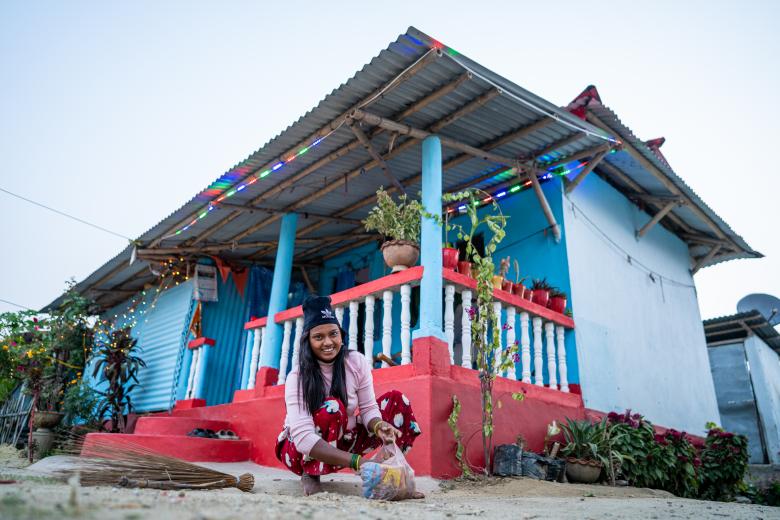
“Having a stable home has left a profound and positive impact on our lives, bolstering our self-confidence. It fills my heart with pride to see my children grow up in such a safe and nurturing environment. I’m grateful for the opportunities I’ve had, and I will continue to strive for a better future for my family and our community,” Pramila emphatically attests.
Together with our implementing partner, the Hilti Foundation, we aim to help more families like Pramila’s lay the foundation for a self-determined future with a safe and affordable home.
An empowered idol
With this newfound confidence behind her, Pramila has worked even harder and is now seen as a role model in her community. By taking part in mason training and helping to build her community, she has earned a sufficient income, which she invested into her business to buy a tricycle. She sets an example for many women in the neighborhood to venture out of their comfort zones and provide for their families.

“I believe that every step we take towards our dreams, no matter how small, propels us closer to success. As I venture into new businesses and embrace learning, my determination knows no limits. I am driven to enhance my capabilities and forge a brighter future for myself and my family,” she concludes.
Cement Bamboo Frame Technology in Nepal
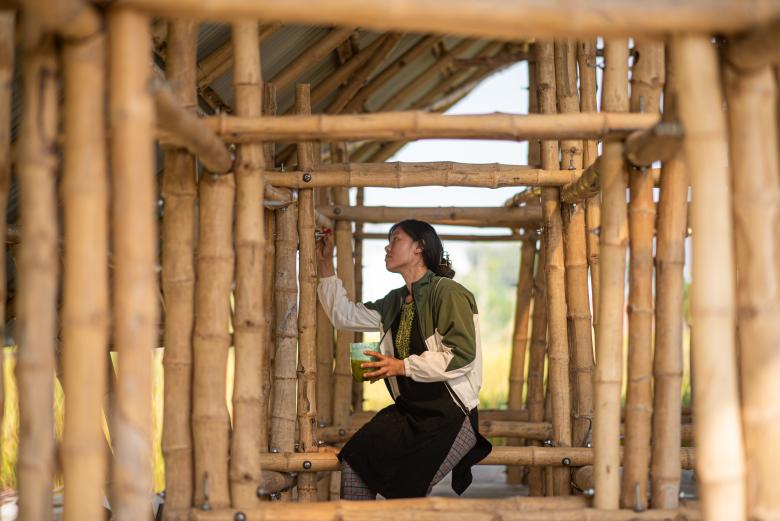
Nepal’s Ministry of Urban Development reports a need for nearly one million homes in the country over the next decade to meet rising demand, yet current construction practices using fired bricks and fuel combustion are expensive and harmful to the environment. Addressing global inflation rates and reducing air pollution from traditional construction methods is crucial. In Madhesh province, over 37% of families have houses with vulnerable bamboo walls, leading to high repair and maintenance costs. In 2012, Hilti engineers began testing Cement Bamboo Frame Technology, utilizing bamboo as the main structural element to provide sustainable, affordable, and disaster-resistant housing. Thanks to the partnership between the Hilti Foundation and Habitat for Humanity, over 274 homes have been built in Nepal using this method by 2023, benefiting communities, establishing local supply chains, and creating rural employment.
Partnership between Habitat for Humanity and the Hilti Foundation
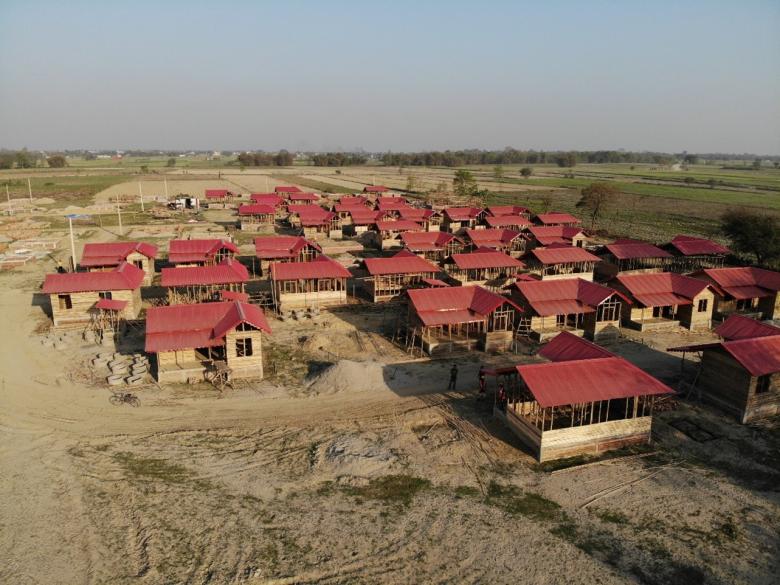
Since 2012, the Hilti Foundation’s partnership with Habitat for Humanity has helped more than 5 million people around the world build or improve their homes by applying innovative, eco-friendly and disaster-resilient shelter technologies, increasing access to affordable financing and transforming market systems. Our partnership is built on four pillars: Driving green construction at scale, creating inclusive markets for innovative housing products, building public-private-private partnerships for holistic housing change, and providing opportunities for employees to engage beyond the business.

Transforming lives in Nepal: Safe homes and empowered communities

We are helping to transform empty spaces into homes
Have you ever considered the sheer number of unused commercial and business premises scattered about? Just picture this: Rather than constructing new houses and apartment complexes, why not repurpose these vacant spaces into warm and welcoming homes for those struggling to find a decent and secure place to live?
Have you ever considered the sheer number of unused commercial and business premises scattered about? Just picture this: Rather than constructing new houses and apartment complexes, why not repurpose these vacant spaces into warm and welcoming homes for those struggling to find a decent and secure place to live?
This strategy offers a sustainable solution to the UK’s housing crisis by using existing structures to address the limited availability of affordable housing and high cost of land.
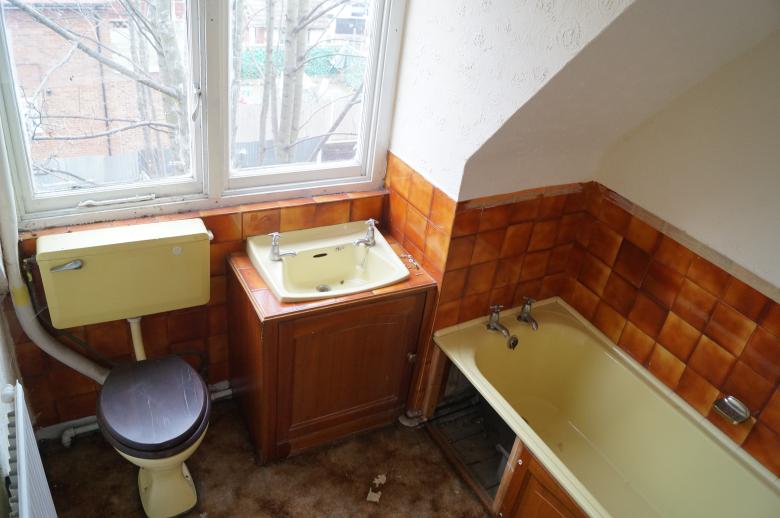
Turning unused premises into warm and welcoming homes
Two years ago, a successful reconstruction project was completed on Gale Street in Dagenham, a town in East London. Today, this property claims three bedrooms with ensuite bathrooms, a communal living and kitchen space, and an additional guest toilet. After furnishing the place with a mix of complimentary and second-hand furniture, and adding those final touches to make it feel like a true home, it was handed over to the London Borough Council of Barking and Dagenham, who will ensure that it is utilised as social housing for the next 15 years.
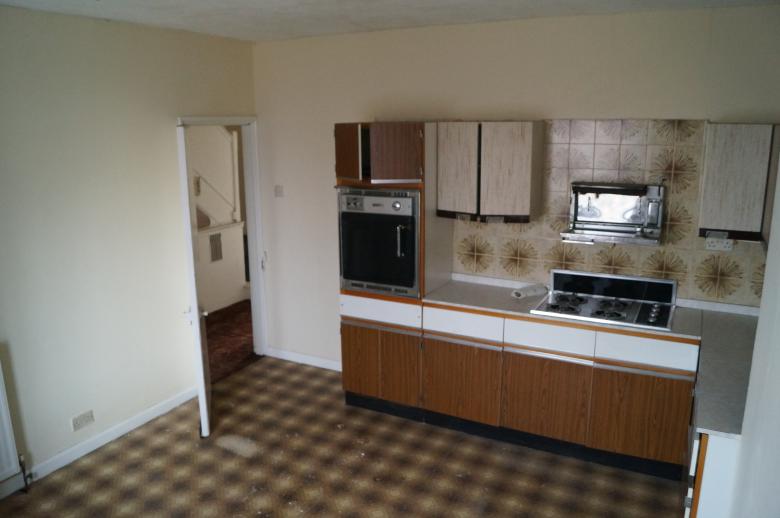
The new occupants have been residing in the shared house for a year and a half now. Among them are three young men, two of whom are asylum seekers. They express profound gratitude for the security and comfort of having a place they can call home.
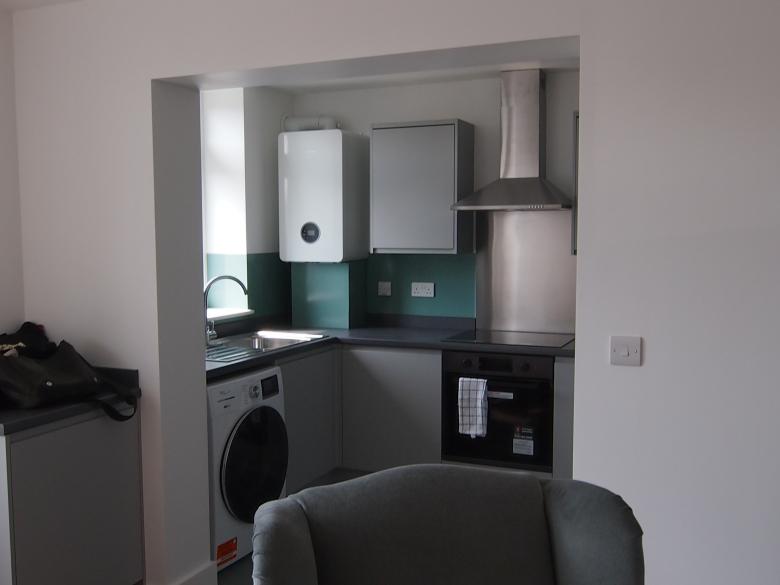
John arrived in the UK in 2002 when he was still a child, seeking asylum from Eritrea. Initially, he lived with foster carers, but like many young people, he longed for independence. Making his own way in the world was a frightening prospect, and he felt nervous. “At first, I was worried. It was my first time living alone. Now I love it. I’m a big man now.” Support from the Council has helped him to learn new skills such as managing money and cooking. He was delighted when he visited the accommodation his social worker had found. “When I first saw the house, I loved it. The people who share it with me are good guys and clean. There is nothing I don’t like,” he said.
Ahmed, also an asylum seeker who had recently left a foster family, shared his friend’s concerns about how he would cope alone and agreed the house had offered a great learning experience. “I have learned many things because I live by myself. We all cook together and clean the house together.” He too loved the house at first sight and especially the extra privacy of having his own bathroom and staying close to his support networks. “Here I also have access to medical support, educational support, and transportation, and I can call my social worker anytime,” he said.
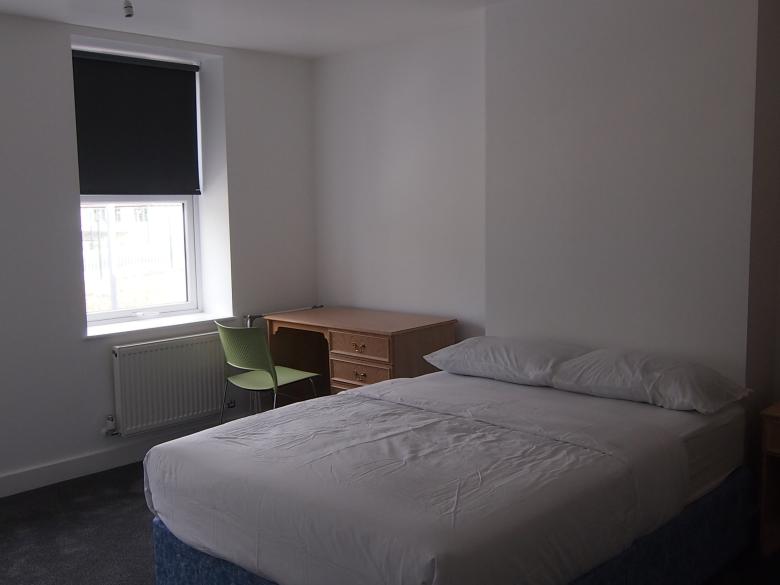
For both men, a comfortable and secure home has given them the space and stability to further their education.
John is currently studying at Barking and Dagenham College. In the coming years, he has hopes for a career in computer programming. “Now I’m excited for the future. I can start to work and live, to make a family. Before I wasn’t thinking about that. Now it’s changed. I want a family and to work,” he said.
“It is very important to have a secure and safe place. When I go out, I feel excited to come back home. Here, it is clean and brand new, and when you sleep, you feel good. The bed is soft on your skin,” John reflects with a sense of appreciation.
This project exemplifies the power of collaboration, dedication, and a shared commitment to social impact. The continued support of our partners has been pivotal in transforming empty commercial spaces into vital social housing for vulnerable community members.
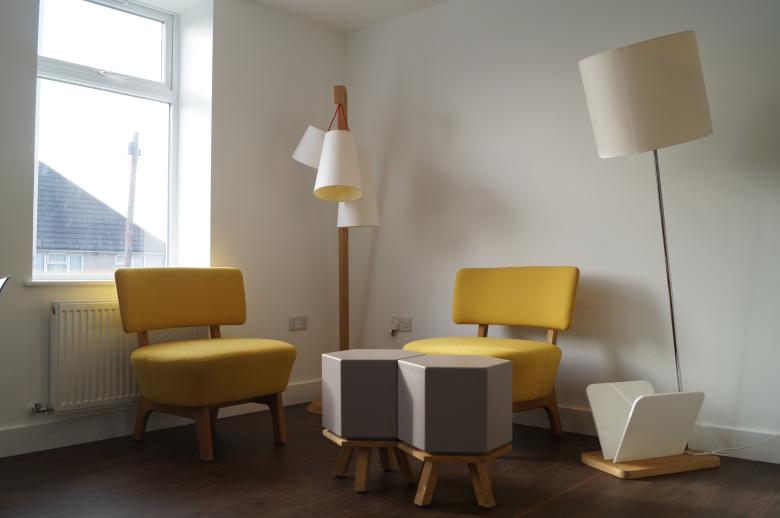

We are helping to transform empty spaces into homes
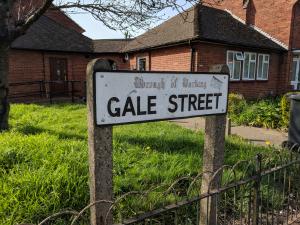
Leading by Example: CEOs Unite to Build Homes and Hope in Romania
Berceni, Prahova County, Romania, May 17th, 2024 – In an inspiring demonstration of leadership and community spirit, 48 business and civil society leaders gathered to participate in Habitat for Humanity Romania’s CEO Build event. This initiative brought together influential figures to build four homes with vulnerable families and advocate for better housing policies across the country.
Berceni, Prahova County, Romania, May 17th, 2024 – In an inspiring demonstration of leadership and community spirit, 48 business and civil society leaders gathered to participate in Habitat for Humanity Romania’s CEO Build event. This initiative brought together influential figures to build four homes with vulnerable families and advocate for better housing policies across the country.
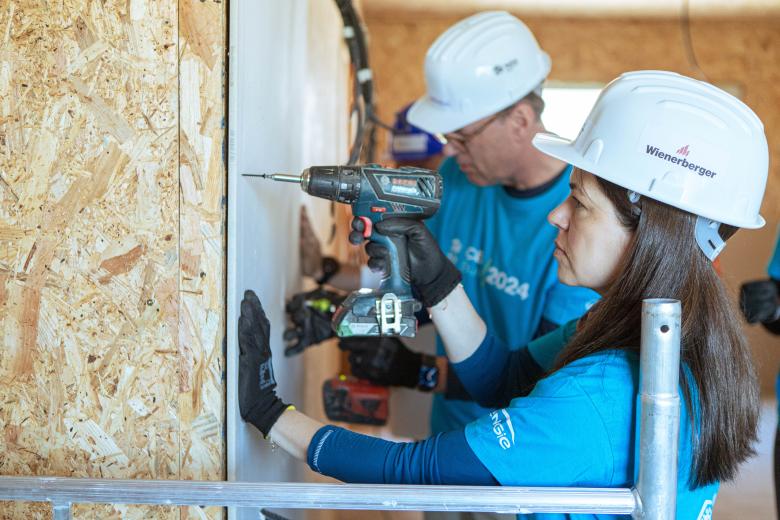
Building More Than Just Homes
Under the motto “Leadership in Action,” the participants worked tirelessly over two days on the construction of four new homes in Berceni, Prahova County. Their efforts are expected to benefit not just these four families but also support another 100 families in Romania in accessing better housing by offering support for home building and renovations.
Adequate and affordable housing leads to better economic, health, and education outcomes; the process of housing improvement is often a ladder out of poverty for families. These changes benefit in turn the larger community, by reducing inequality and building resilience against economic and natural disasters. Build events like the CEO Build are designed to complement Habitat’s broader advocacy and strategy work for affordable housing at the national, regional, and global levels.
Roberto Pătrașcoiu, CEO of Habitat for Humanity Romania, highlighted the impact of this initiative: “The participation of business leaders and civil society in the CEO Build event demonstrates the power of solidarity and social responsibility. The construction of these houses is not just about the walls and the roofs, but about offering a real chance at a better future for vulnerable families.”
Leadership in Action: A Model for Community Engagement
The event was attended by Habitat’s partners, including Ioana Totoian, Business Development Manager at Wienerberger, and Monica Csaszar, Industrial Director of Glass at Saint-Gobain Romania, showcasing a collaborative effort across various sectors.
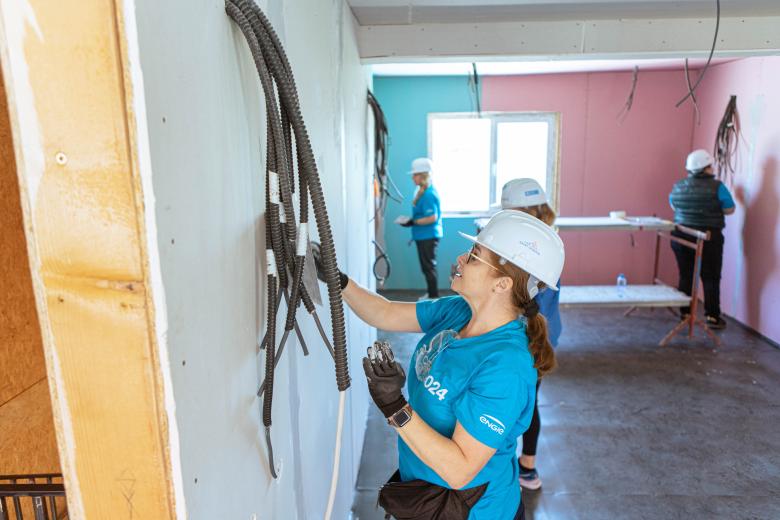
Jonathan Reckford, CEO of Habitat for Humanity International, underscored the global significance of such local initiatives. He remarked, “The event was a remarkable success, and we are grateful for the support and participation of everyone. When you get involved as a volunteer, you become part of the community and do something truly transformative that creates intergenerational change for the families benefiting from these homes.”
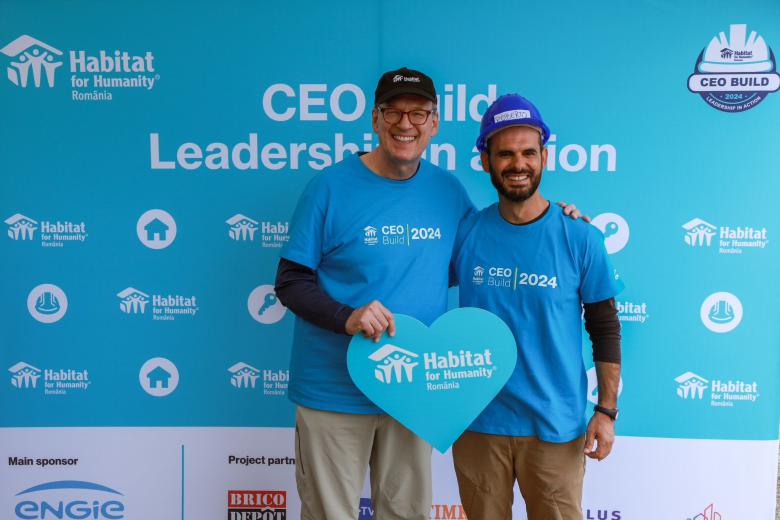
A Vision for the Future
This CEO Build event is part of a larger project managed by Habitat for Humanity Romania, aiming to provide homes for 12 families comprising 45 members. These families were identified in collaboration with local authorities, ensuring that the new homes will significantly improve their quality of life.
In fact, one out of ten Romanians faces housing problems, living in homes where rainwater leaks through the roof and walls, creating a damp environment. Additionally, according to the National Institute of Statistics and Economic Studies, 21% of Romanians live in households without indoor sanitary facilities.
By leading through action, these CEOs have set a powerful example for others in the business and civil sectors to engage in their communities and make a tangible difference. Their hands-on participation not only built homes but also hope and dignity for those in need of decent housing, paving the way for a brighter future for many Romanian families.
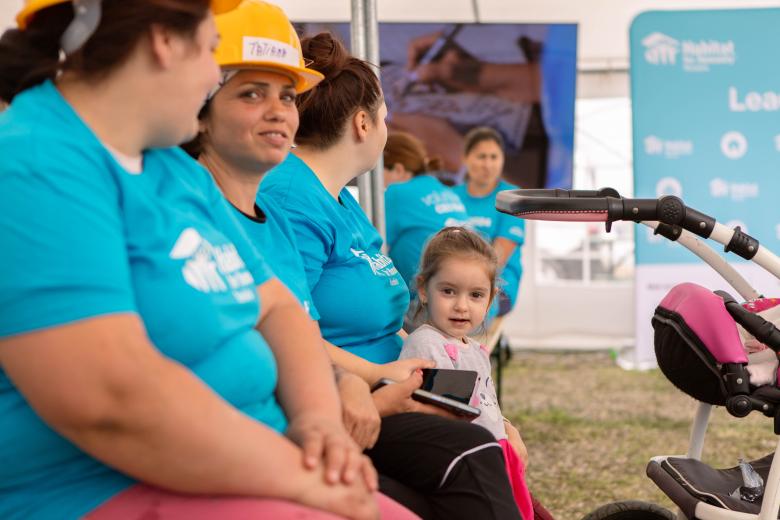
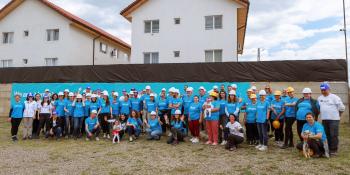
Leading by Example: CEOs Unite to Build Homes and Hope in Romania
Africa Day 2024: Championing access to affordable housing for a more equitable future for education
As we mark International Africa Day on May 25th, 2024, we celebrate the vibrant mix of cultures, histories, and futures that define our diverse continent. This year’s theme, “Educate an African Fit for the 21st Century: Building Resilient Education Systems for Increased Access to Inclusive, Lifelong, Quality, and Relevant Learning in Africa,” is not only a call to action but also a reminder of the critical work we are doing at Habitat for Humanity to build resilient, inclusive, and sustainable communities across Africa. A report shared by Habitat for Humanity emphasizes the direct link between housing and the Sustainable Development Goals (SDGs), stating that adequate housing contributes to better health outcomes, educational attainment, economic stability, and overall well-being. The report highlights that improved housing can lead to significant progress in achieving multiple SDGs, particularly those related to poverty alleviation, health, education, and sustainable cities.
Truly, this year’s Africa Day theme hits home as it underscores the importance of education in building resilient societies. Education and housing are deeply interconnected, as stable homes provide the foundation for children to learn and grow and through our Home Equals campaign, Habitat for Humanity is advocating for better housing policies worldwide, emphasizing that safe, decent, and affordable housing is crucial for educational success and overall well-being.
Africa has come a long way since the establishment of the African Union (AU) in 1963. The AU has been instrumental in promoting unity, peace, and development across the continent. However, challenges persist including rapid urbanization, climate change, and migration pressures. While our cities have been transformed into engines of economic growth, these challenges have placed an added strain on urban infrastructure and housing all which present as a challenge towards access to education for all.
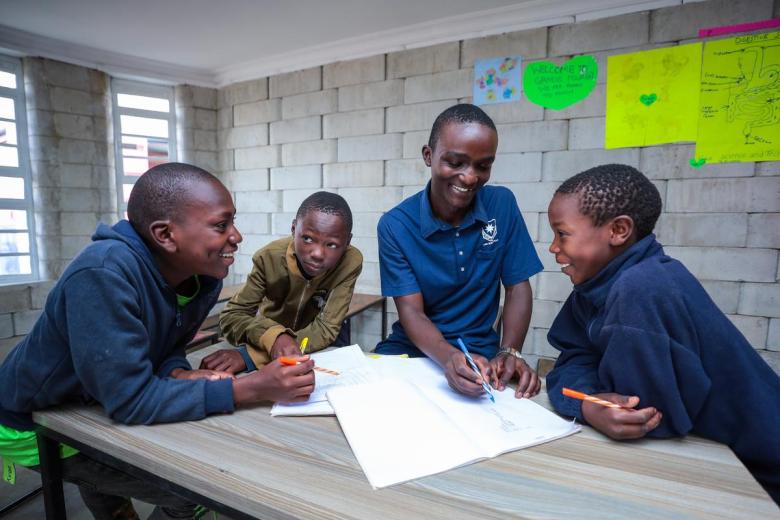
Championing policy reform to bridge Africa’s housing gap
Indeed, the world faces a significant housing deficit, with an estimated 1.6 billion people lacking adequate housing according to UN Habitat. In Africa alone, the housing deficit affects over 50 million people according to 2020 research by the African Development Bank, reflecting the urgent need for sustainable housing solutions.
At Habitat for Humanity, we have had the privilege of fostering partnerships with diverse civil society organizations, stakeholders, and governments to develop robust policy positions and amplify the voices of those we serve. Together, we are making strides in addressing critical issues such as urbanization, climate change, and migration, all of which are directly linked to providing quality education for all, across the continent.
Impact of Conflict and Climate Change on education in the continent
Conflicts and climate change are major drivers of displacement and housing crises. As of 2022, over 103 million people worldwide were forcibly displaced due to conflict and persecution, with approximately 8.7 million people internally displaced by disasters, many in Africa. These challenges are particularly severe in regions such as the Sahel and the Horn of Africa, where millions are affected by conflicts and extreme weather events which exacerbate housing shortages.
As a key response, Habitat for Humanity Malawi has pioneered the use of sustainable construction techniques to mitigate the impact of climate change. After Cyclone Idai, one of the worst tropical cyclones to hit Africa and the Southern Hemisphere, we assisted affected communities by providing emergency shelter solutions and rebuilding homes. This response also included the provision of temporary shelters and the repair of damaged homes for over 10,000 people, providing them with safer, more resilient housing options.
Among other benefits for the families, this ensured that children had a safe and conducive environment to study which will go a long way in improving educational outcomes.
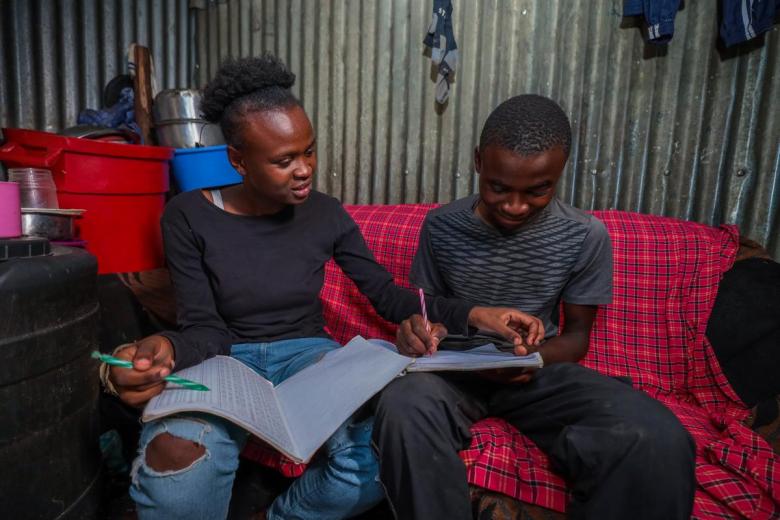
Strategic Collaboration for a Sustainable Future
While we have achieved great impact, we recognize that the journey to achieving the AU Agenda 2063 and SDG 2030 is a collective effort. Governments, regional bodies, civil society organizations (CSOs), communities, and international partners must work strategically and cohesively. Our role at Habitat for Humanity is to ensure that housing is recognized as a fundamental component of this developmental framework. Adequate housing is not just about shelter; it encompasses dignity, health, and economic opportunity.
In Kenya, for instance, we have been actively involved in legal advocacy and policy reform initiatives aimed at improving land tenure security. Working through and with our partners, we have supported projects that not only provide housing solutions but also support education initiatives. This includes constructing classrooms and sanitation facilities in HomaBay County, in collaboration with the Ministry of Education and the community.
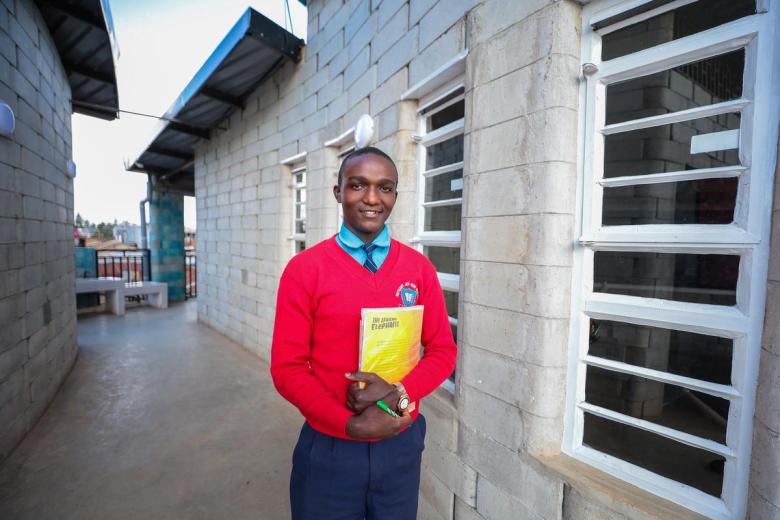
Kofi Annan once said, “Knowledge is power. Information is liberating. Education is the premise of progress, in every society, in every family.” By harnessing the power of knowledge, collaboration, and innovation, we can drive progress across our beloved continent.
As we celebrate International Africa Day, let us reaffirm our dedication to building a resilient and educated Africa. We must continue to advocate for policies that support sustainable urban development, address climate change, and ensure equitable access to resources. Our collective efforts will not only contribute to the AU Agenda 2063 and SDG 2030 but will also pave the way for a brighter, more inclusive future for all Africans. Together, we can shape Africa’s tomorrow—one brick, one book, one dream at a time.
Happy Africa Day 2024!
Blog by Grace Ananda, HFH Africa’s Policy and Advocacy Manager
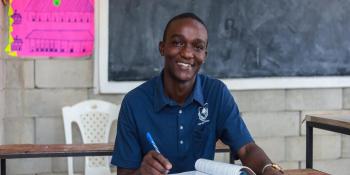
Africa Day 2024: Championing access to affordable housing for a more equitable future for education
Britam and Habitat for Humanity expand partnership to strengthen property insurance penetration rate in Kenya.
Habitat for Humanity International Joins Call to Alleviate Humanitarian Crisis in Gaza
New initiative to address energy poverty in central and eastern Europe
Ukraine Rapid Gender Analysis: Gender in Emergencies Group
Pre-existing gender and identity inequalities are being compounded by the Ukraine war – affecting the risks and impacts of the war, the patterns of displacement, and access to humanitarian aid. Vulnerabilities due to longstanding gender inequality intersect with several other aspects of identity diversity within Ukraine, that have traditionally resulted in discrimination and inequities. Read more about the challenges in the Ukraine Rapid Gender Analysis.